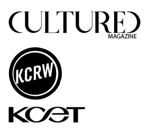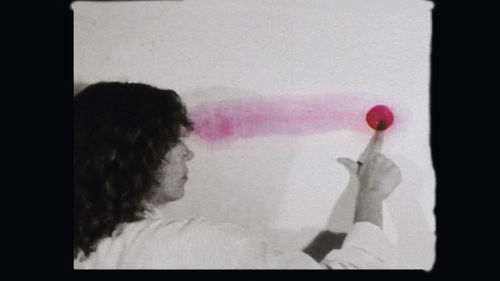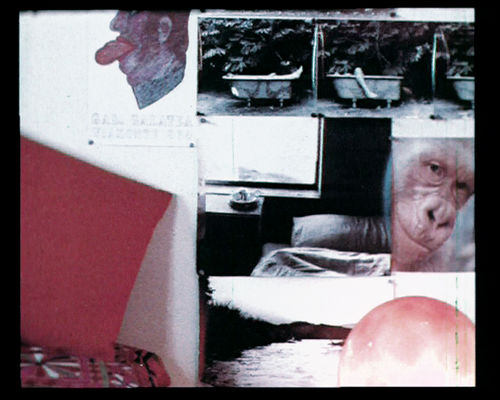
Talleres: Experimental Women Filmmakers from Latin America
- This is a past program
Copresented with Los Angeles Filmforum
Showcasing rare works by female filmmakers who carved out a place within the male-dominated world of Latin American independent film, this program includes Uruguayan filmmaker Lydia García Millán’s Color (1955), one of the first abstract experimental films from Latin America; Narcisa Hirsch’s Workshop (1975); the politically charged Super 8 experiments by Puerto Rican underground artist Poli Marichal; and recent video essays by Mexican artist Ximena Cuevas. Curated by Ángela López Ruiz.
Films
Umbrales. Marie Louise Alemann, Argentina, 1980 19 mins, color, Super 8, transferred to digital.
Color. Lydia Garcia, Uruguay, 1955, 3 mins, color, 16mm.
Tango: el Narrador. Luz Zorraquín, Argentina, 1991, 7 mins, video.
Desnudo con alcatraces. Silvia Gruner, Mexico, 1986, 1:50 mins, B&W, Super 8, transferred to digital.
Taller. Narcisa Hirsch, Argentina, 1976/1977, 10 mins, color, Super 8, transferred to digital.
Devil in the Flesh/Diablo en la piel. Ximena Cuevas, Mexico, 1998, 5 mins, Color, video.
Popsicles. Gloria Camiruaga, US/Chile, 1982–84, 4:42 mins, color, video.
Blues Tropical & Paisaje. Poli Marichal, Puerto Rico, 1982-1985, 6:49 mins, Color, Super 8, transferred to digital.
Paracas. Cecilia Vicuña, US/Chile, 1983, 18:31 mins, color, 16mm, transferred to digital.
Copacabana Beach. Vivian Ostrovsky, US/Brasil, 1983, 10:08 mins, Color, Super 8, transferred to digital.
Biography
Ángela López Ruiz is a visual artist, curator, and researcher from Montevideo, Uruguay. She has a degree in visual arts from the Universidad de la República (Uruguay) where she is currently finishing her Masters in Latin America Studies. She is part of the curatorial team of Ism, Ism, Ism: Experimental Cinema in Latin America, and contributed a chapter on the silenced protagonism of women filmmakers in the history of Latin America experimental cinema. She works as advisor on the Film Laboratory of the Contemporary Art Foundation and member of this artists' collective based in Montevideo since 1999. Her research about experimental cinema, performance, and video art had been exposed in 29º San Pablo Biennal (Brasil), Ambulante (México), Paralelo/Manifesta8 (España), Cine a Contracorriente (Barcelona), 30º San Pablo Biennal (Brasil), Filmmakers Coop (NY), PhD in Practice (A.K, Viena), San Francisco Cinematheque (SFO), Union Docs (NY), SCCA-Lubljana (Slovenia), and more. She is a guest professor in the postgraduate program of EICTV-Cuba.
Talleres: Realizadoras cinematográficas experimentales de Latinoamérica
Jueves 30 de noviembre a las 7:30 p. m.
Presentado conjuntamente con Los Angeles Filmforum
Este programa, que resalta trabajos excepcionales de realizadoras cinematográficas que lograron insertarse en la esfera del cine latinoamericano independiente dominada por hombres, incluye Color (1955), de la realizadora uruguaya Lydia García Millán, una de las primeras películas experimentales abstractas de Latinoamérica; Workshop (1975), de Narcisa Hirsch; experimentos políticamente cargados en Súper 8 de la artista portorriqueña underground Poli Marichal; y ensayos recientes en video de la artista mexicana Ximena Cuevas. Curado por Ángela López Ruiz.
This program is part of the Los Angeles Filmforum film series Ism Ism Ism: Experimental Cinema in Latin America, part of Pacific Standard Time: LA/LA. Major support is provided through grants from the Getty Foundation. Additional support provided by the Andy Warhol Foundation for the Visual Arts and the National Endowment for the Arts.
Este programa forma parte de la serie cinematográfica de Los Angeles Filmforum lsm lsm lsm: Experimental Cinema in Latin America, presentado dentro del marco de Pacific Standard Time: LA/LA. La Getty Foundation proporciona un importante apoyo financiero, y se recibió apoyo adicional de la Andy Warhol Foundation for the Visual Arts y el National Endowment for the Arts.
All Hammer public programs are free and made possible by a major gift from an anonymous donor.
Generous support is also provided by Susan Bay Nimoy and Leonard Nimoy, Good Works Foundation and Laura Donnelley, an anonymous donor, The Samuel Goldwyn Foundation, and all Hammer members.
The Hammer’s digital presentation of its public programs is made possible by the Billy and Audrey L. Wilder Foundation.
Radical Women: Latin American Art, 1960-1985 is organized by the Hammer Museum, Los Angeles, as part of Pacific Standard Time: LA/LA, an initiative of the Getty with arts institutions across Southern California. The exhibition is guest curated by Cecilia Fajardo-Hill, Andrea Giunta with Marcela Guerrero former curatorial fellow, in collaboration with Connie Butler, chief curator, Hammer Museum.
Radical Women: Latin American Art, 1960–1985 is made possible through lead grants from the Getty Foundation.
Major funding is provided by the Diane and Bruce Halle Foundation and Eugenio López Alonso. Generous support is provided by the Vera R. Campbell Foundation, Marcy Carsey, Betty and Brack Duker, Susan Bay Nimoy, and Visionary Women.
Additional support is provided by the Radical Women Leadership Committee and the Friends of Radical Women.

Media sponsorship is provided by Cultured magazine, KCET, and KCRW 89.9 FM.













![Sandra Eleta (Panamanian, b. 1942), Edita (la del plumero), Panamá (Edita [the one with the feather duster], Panama), 1977](/sites/default/files/styles/related_content_teaser/public/migrated-assets/media/exhibitions/2017/PST_Radical_Women/Eleta__Sandra.jpg?h=46193da9&itok=I4LXMVqO)
















![María Evelia Marmolejo (Colombian, b. 1958), Anónimo 1 (Homenaje a los desaparecidos y torturados dentro de los hechos violentos) (Anonymous 1 [homage to those disappeared and tortured in violent incidents]), 1981.](/sites/default/files/styles/related_content_teaser/public/migrated-assets/media/exhibitions/2017/PST_Radical_Women/Marmolejo__Maria_Evelia_Anonimo_1.jpg?itok=Bhg0C-jD)







